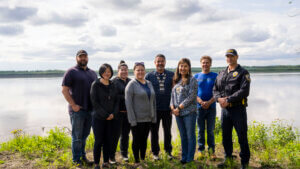 In June, Tanana Chiefs Conference (TCC) leadership traveled to Galena to meet with the Louden Tribe to discuss the urgent need for salmon conservation on the Yukon River. The meeting, spearheaded by Chief Charlie Green of Louden, brought together representatives from the Alaska State Troopers and the U.S. Fish and Wildlife Services to address the critical state of Yukon River salmon populations and explore collaborative conservation efforts.
In June, Tanana Chiefs Conference (TCC) leadership traveled to Galena to meet with the Louden Tribe to discuss the urgent need for salmon conservation on the Yukon River. The meeting, spearheaded by Chief Charlie Green of Louden, brought together representatives from the Alaska State Troopers and the U.S. Fish and Wildlife Services to address the critical state of Yukon River salmon populations and explore collaborative conservation efforts.
Recent salmon runs on the Yukon River have reached alarmingly low levels, prompting immediate action to safeguard these vital resources for future generations. “I really want fish for my grandkids. I would never eat another fish if it meant that my grandchildren could have salmon when they grow up,” expressed Chief Charlie Green. “We need to find ways to work together. We are all in this for one reason – to protect our fish.”
TCC acknowledges that the burden of conservation should not fall disproportionately on Alaska Native people, and the organization remains committed to addressing issues such as trawler bycatch and Area M intercept, a longstanding challenge. Chief Brian Ridley of TCC highlighted this ongoing effort, stating, “While conservation of our salmon should not rely solely on our Native people, it is important that we continue to be trusted stewards of our lands and resources. TCC continues to testify and advocate at the State and Federal levels to ensure that we do everything we can to protect our salmon.”
Last year, TCC partnered with the Association of Village Council Presidents (AVCP) to file a lawsuit against the National Marine Fisheries Service (NMFS). The lawsuit contends that NMFS unlawfully relied on outdated environmental studies when establishing groundfish catch limits for the Bering Sea and Aleutian Islands for 2023-2024, failing to account for significant ecosystem-wide changes over the past two decades. This legal action underscores TCC’s commitment to holding regulatory bodies accountable and ensuring that current environmental realities are considered in decision-making processes.
TCC has also been litigating against the development of Ambler Road, and the U.S. Department of Interior’s Bureau of Land Management recently chose a “no action” option for its environmental analysis. While this is a huge win to protect subsistence resources, TCC will continue to advocate for the protection of important spawning grounds for salmon, sheefish, and whitefish along the Alatna River, Wild River, John River, Henshaw Creek, Iniakuk River, Malamute Fork, and Helpmejack Creek. TCC will continue to protect its region against threats that are likely to severely harm these fish populations.
TCC has also been continuously fighting for more Indigenous representation on boards and committees to ensure that the subsistence voice is adequately represented in areas where important decisions are being made about the resources we rely on. This effort is crucial for ensuring that policies reflect the needs and knowledge of those who depend on salmon for their cultural and subsistence practices.
The meeting in Galena underscored the shared responsibility in preserving salmon populations. Chief Green’s discussions with State and Federal representatives highlight a unified front in the battle for salmon conservation. The hope is that through these efforts, future generations will continue to benefit from the rich salmon resources that have sustained Alaska Native people for centuries.
In addition to advocacy and collaboration, it is crucial that everyone follows the fishing regulations set by the State. Adhering to these regulations ensures that we are all doing our part to protect salmon populations. More information can be found on the Alaska Department of Fish and Game website: https://tinyurl.com/ADFG-Alaska
We also encourage everyone to participate in the YRDFA In-Season Teleconferences held every Tuesday. These teleconferences provide first-hand information during the fishing season, address management questions, and facilitate the sharing of traditional ecological knowledge. They promote interaction among rural residents, agencies, and other organizations by creating a forum for all of these entities to call in together to a weekly, organized, and structured call. Upcoming teleconference details can be found here: https://yukonsalmon.org/event-calendar/
TCC leadership, along with the Louden Tribe, remains dedicated to making significant strides in salmon conservation. Every salmon counts in the effort to preserve this crucial part of Alaska’s ecosystem and cultural heritage.
As TCC and its partners continue their advocacy and conservation efforts, they call upon all subsistence fishers to join in protecting the Yukon River salmon. Together, through cooperation and determined action, we can ensure that future generations inherit a thriving and sustainable salmon population.
